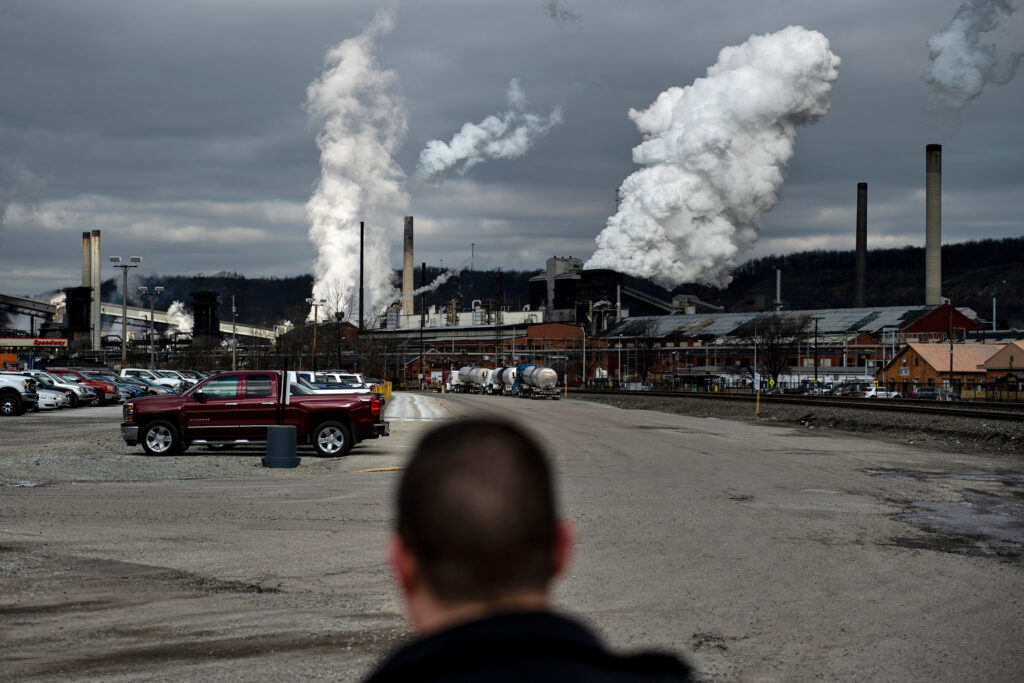CHICAGO—Southwest Side residents implored city health and planning officials last week to reconsider the future of two century-old towering grain elevators, empty for years, that an asphalt company wants to demolish.
Thursday, the city issued the demolition permits.
The company that owns the 23-acre site along the Chicago River has a history of harming the health of the community, residents said at a public meeting on Friday, organized by the mayor’s office and the local alderwoman to outline safety protocols for the demolition. Many of them said the city should think imaginatively about how to preserve rather than wreck the 80-foot concrete Damen Silos, built in 1906.
The dozens of residents who turned out for the meeting at a community college near the site faced tough odds: The U.S. Army Corps of Engineers, which conducted an independent environmental review of the site, gave the company the go-ahead last year. An Army Corps permit was required because the Chicago River is a federally regulated waterway.
We’re hiring!
Please take a look at the new openings in our newsroom.
See jobs
As Friday’s meeting convened, city officials had yet to grant the demolition permits, and neighbors had hoped there was still time to reconsider.
Officials from the mayor’s office, the Department of Public Health and the Department of Buildings who attended the meeting rebuffed many of the residents’ requests by pointing out that the meeting was to consider the demolition process—not the merits of demolition or the future of the site.
MAT Limited Partnership, a local company that operates an asphalt plant nearby and receives millions of dollars in city contracts, bought the property from the state in 2022 for $6.5 million. Since then, its MAT Asphalt plant has been cited by the city for environmental violations and in 2023 agreed to pay $1.2 million to settle a class-action lawsuit from neighbors who said dust, smoke and odors from the plant harmed their ability to go about their lives. The company denied at the time that it had done anything wrong.
Michael Tadin Jr., a co-owner of the plant and now the owner of the silos, previously said he was considering the site for a new corporate headquarters. More recently he’s said he doesn’t yet have plans for it. He did not return messages from Inside Climate News asking for comment.
Neither city officials nor MAT offered any details on the site’s future use during the meeting.
Mara Georges, an attorney who represented the company at the meeting, said the city would be consulted on future plans for the site. “The site is large and next to a waterway, so it will be a planned development,” she said. “What that means is it is a highly negotiated process for development with the city.”
Residents repeatedly asked the city during the 90-minute meeting to prevent the demolition.
McKinley Park Development Council, a neighborhood nonprofit group that advocates for equitable development, is circulating a petition—so far with about 900 signatures—to preserve some elements of the silos and turn the site into a festival grounds and city park. Preservation Chicago, a group that advocates for endangered buildings, has said it would help orchestrate any deal to turn the silos into a public space and community hub.
Many people at the meeting said they feared that MAT viewed their neighborhood only for its industrial or corporate potential and would not be a good neighbor.
“We don’t know what the owner is planning to do,” said Ward Miller, executive director of Preservation Chicago. “He has not been clear on that.”
Asked one resident who spoke at the meeting: “Is there anything we can do to make sure that MAT Asphalt doesn’t open up another air polluting, big-ass factory in our neighborhood?”
The demolition falls under a planning category known as an environmentally complex demolition. Chicago created the designation after a city-approved plan to demolish the Crawford coal-fired power plant in 2020 unleashed a cloud of dust that coated nearby houses and streets.
City officials said inspectors from the Chicago Department of Public Health as well as the Department of Buildings would be on site to observe the demolition.
Buildings Commissioner Marlene Hopkins, who oversaw the Crawford demolition, said the silos would be demolished with excavators and that no explosives would be used.
Public Health Commissioner Dr. Olusimbo Ige presented a plan for controlling dust and monitoring air quality during demolition. Four portable air-monitoring devices will track airborne particulate matter, she said, which the EPA classifies as inhalable to the lungs and adverse to health at a diameter of 10 microns or less, far thinner than a strand of hair.
The monitors, which will be operated by an environmental consultant, will report air-quality levels every 15 minutes and work will be halted if conditions exceed federal Environmental Protection Agency standards for particulate matter.
A plan to use water from the Chicago River to tamp down dust was authorized by the Army Corps, Ige said.
Brian Fealy, general superintendent of Heneghan Wrecking, which MAT Limited hired for the demolition, said the company’s fleet of equipment has dust suppression and water connection points. High-reach excavators are equipped with water connections to spray directly on what is being demolished at the time. The company also plans to use DustBoss equipment that will oscillate and “encapsulate the whole project,” he said, as well as hand-held water hoses, a water truck equipped with a water cannon and side sprayers.
The company plans to use barges as catch decks to protect the river from falling debris, Fealy said. During demolition, he said, 90 percent of the demolished material will be pushed below grade, or into the current basement below the silos.
There were doubters in the crowd about the plan to protect the river. “There’s a logic to the strategy, but obviously small bits of things would slip through,” said Kate Eakin, managing director of the McKinley Park Development Council. “The seawall is in terrible shape, so there’s not a continuous surface to push barges against, either.”
Others said the plan to weigh the dust down with water would result in contaminated water flowing into the river. Fealy insisted that wouldn’t happen, saying the company plans to use silt socks to block exposed areas.
Citlalli Trujillo, a member of the Pilsen Environmental Rights and Reform Organization, a grassroots group that was formed to fight disproportionate pollution in Chicago’s Pilsen neighborhood, said that for McKinley Park and surrounding neighborhoods, which the city considers overburdened by air pollution, the demolition would only add to existing problems. She said the threshold for stopping work should be well below the EPA level for particulate matter, given the pollution now in the air.
Ige of the public health department said changing the action level would require the City Council to pass legislation that would make the city’s action level more stringent than state and federal levels.
“We’ve got buildings that are deteriorating. We’ve got trespassers continually on the site. We’re afraid someone is going to get hurt.”
— Mara Georges, an attorney representing MAT Limited Partnership
Another attendee asked if the demolition would continue on citywide bad air quality days, which have risen because of wildfire smoke. Ige said the threshold for halting work would remain the same regardless of citywide air quality.
Another resident wondered aloud why the community again was a “sacrifice zone” for heavy manufacturing and industry, referring to the city’s history of systematically concentrating industrial facilities in Black and Latino neighborhoods.
Many attendees criticized MAT Limited. Eakin, of McKinley Park Development Council, thanked the public health department for responding to her many calls about air quality problems from the plant. She said she finds asphalt dust and particles in her house several times a week.
Rachel Havrelock, professor at the University of Illinois Chicago and founder of the Freshwater Lab, said the company should monitor water quality before and after demolition—and that the city had a responsibility to ensure high standards. She said that public money invested in cleaning the river would be wasted with the demolition.
“The property may be privately owned by Michael Tadin Jr., but the water remains under the public trust,” she said.
Attendees called on the city to find a more creative use for the property, pointing to other cities that have preserved and repurposed similar structures into parks or entertainment centers. “Everyone here can think of 10 better things to put on that site,” said Devin Gora, an architectural designer who lives in the Pilsen neighborhood, roughly two miles from the property.
Residents said tearing down the structures amounted to tearing down the neighborhood’s history. “Why? Because someone could afford to buy it and tear it down,” said Tony Adams, a McKinley Park resident.
Miller, of Preservation Chicago, said the structures should get historic landmark status. Sara Mathers, a representative from the Mayor’s Office of Community Engagement, responded that the silos were evaluated for potential landmark designation but did not qualify because they are not structurally sound.
Georges, the MAT attorney, said the company was concerned about safety at the property. “We’ve got buildings that are deteriorating. We’ve got trespassers continually on the site. We’re afraid someone is going to get hurt,” she said.
Georges acknowledged at the meeting that the company does not have an environmental remediation plan should a disaster occur during demolition.
Joseph Gamble, a historian who works for Friends of the Chicago River, said in an interview after the meeting that he wasn’t surprised to hear that MAT Limited didn’t have such a plan. “None of the other industry owners [in the area] are so distrusted and disliked,” he said. “I think that’s largely due to miscommunication by the owner and a disregard for the wants of the people.”
He noted that last winter a large chunk of debris fell into the North Branch of the river, where the Chicago Tribune publishing facility is being demolished to make way for a casino. “These things happen, and that’s just the point. You can have all the plans in the world, but something is going to happen regardless.”
Daniel Pogorzelski, a former commissioner of the Metropolitan Water Reclamation District of Greater Chicago, said he was skeptical the demolition could be completed without incident. He called on the city to exact penalties should the company fail to keep its promises.
“How many of these do we need to be a disaster before we get serious about cleaning up the river?” he asked in an interview after the meeting.
Pogorzelski said the silos could qualify for historic landmark status with some repair. “It’s crazy the administration can’t figure out a way to make this work,” he said.
Gamble would like to see the property converted to public green space even if the structures have to be demolished, particularly because there are few points of access along the South Branch of the river. “People have been talking about the need for riverfront green space and access for 130 years,” he said. “When are we going to have a site this large ever open up again for the possibility of public ownership?
“This is a chance to do something for the people,” he said.
About This Story
Perhaps you noticed: This story, like all the news we publish, is free to read. That’s because Inside Climate News is a 501c3 nonprofit organization. We do not charge a subscription fee, lock our news behind a paywall, or clutter our website with ads. We make our news on climate and the environment freely available to you and anyone who wants it.
That’s not all. We also share our news for free with scores of other media organizations around the country. Many of them can’t afford to do environmental journalism of their own. We’ve built bureaus from coast to coast to report local stories, collaborate with local newsrooms and co-publish articles so that this vital work is shared as widely as possible.
Two of us launched ICN in 2007. Six years later we earned a Pulitzer Prize for National Reporting, and now we run the oldest and largest dedicated climate newsroom in the nation. We tell the story in all its complexity. We hold polluters accountable. We expose environmental injustice. We debunk misinformation. We scrutinize solutions and inspire action.
Donations from readers like you fund every aspect of what we do. If you don’t already, will you support our ongoing work, our reporting on the biggest crisis facing our planet, and help us reach even more readers in more places?
Please take a moment to make a tax-deductible donation. Every one of them makes a difference.
Thank you,
















